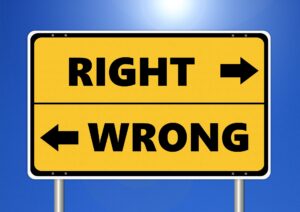Have you ever thought about how you know if something is morally right or morally wrong? It feels like you ‘just know’ it. While you may have been taught things that are right and wrong, there are some things that you simply know, without being taught, that it is wrong. This is commonly called the moral law.
- Morality involves knowing right from wrong; it can be objective (universal) or subjective (personal/cultural), with subjective morality leading to issues.
- Subjective morality lacks consistency, universality, and objectivity, potentially leading to moral relativism and bias.
- Objective morality suggests the existence of universal moral laws, which aligns with the Christian belief in a moral law giver, God.
Objective Morality vs Subjective Morality
Morality refers to the principles and values that guide human behavior and decision-making. There are two main types of morality: objective morality and subjective morality.
Objective morality refers to the belief that moral principles and values are universal and objective, meaning they moral law is true regardless of what individuals or cultures believe. In other words, objective morality holds that there is a right and wrong that exists independently of human opinion. Proponents of objective morality argue that moral principles and values are grounded in reason, logic, and evidence, and that they can be discovered through careful reflection and study. They also argue that objective morality is necessary for a just and harmonious society, as it provides a common framework for determining what is right and wrong.
Subjective morality, on the other hand, refers to the belief that moral principles and values are personal and relative, meaning they are determined by individual or cultural beliefs. In other words, subjective moral law holds that there is no objective right or wrong, and that moral principles and values are simply a matter of personal opinion. Proponents of subjective morality argue that moral principles and values are a product of human experience, culture, and tradition, and that they can change over time. They also argue that subjective morality allows for diversity and flexibility in human societies.
It is worth noting that there is also a third approach, known as moral relativism, which is the belief that there are no objective moral truths, but that moral truths are instead relative to the individual or culture. This view is similar to subjective morality, but it takes the idea a step further by arguing that moral principles and values are not just personal or cultural, but that they are entirely relative.
The Problem With Subjective Moral Law
Ultimately there are several problems with subjective morality.
- Lack of consistency: Different individuals may have different moral beliefs, leading to a lack of consistency and agreement on what is morally right or wrong.
- Lack of universality: Subjective morality may only be applicable to a certain group of people or society, and may not be universally applicable to all cultures or individuals.
- Lack of objectivity: Without an objective foundation, it can be difficult to resolve moral disputes or to determine the right course of action in a given situation.
- Ethical subjectivism, in which moral claims are considered true or false depending on the individual or society, can be problematic because it may lead to moral relativism, which denies the existence of moral truths and may justify harmful actions.
- Personal bias: A person’s subjective morality may be influenced by their own personal experiences, biases, and prejudices, which can lead to unfair and unjust decisions.
Simply put, subjective morality is whatever feels right at the moment by an individual. But by believing in that, it means that the person must acknowledge that other views are equally weighted against there own and they are settling on the reality that there is no true right and true wrong that is universal such as murder or hatred.

This Means There Must Be An Objective Moral Law
If subjective morality is incorrect, then it stands to reason that objective morality is the right path. If objective morality is the right path, there must be a basis for a moral law that extends beyond all cultures and all nationalities. To say that something is morally right or morally wrong, regardless of presupposition requires a set of rules that were established somehow. This is where the Christian view comes in. We believe there is indeed a set of pre-established moral laws. They were given by a moral law giver. That moral law giver holds dominion over all the universe and we call him God.



